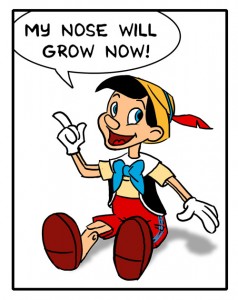Let’s be honest
When discussing copywriting assignments with my clients, I sometimes feel obliged to point out that whatever I write about their business should be true.
It’s not that they’re asking me to tell outright lies. It’s more a desire to be over-optimistic or economical with the truth in areas such as the scope or depth of their services, the size of the business or the nature of their approach. The urge to ‘big up’ the offering is powerful.
Many small marketing firms fall prey to this temptation, anxious to position themselves as ‘full-service’ agencies instead of playing to their unique (albeit narrow) strengths. I have also worked with many sole traders who wanted to position themselves as companies (in fact, I do it myself).

Paradoxical Pinocchio
Since words can carry so many shades of meaning, it’s easy enough for the copywriter to bend or stretch the truth without overstepping the mark. Trusty stalwarts like ‘leading’, ‘extensive’, ‘premium’, ‘consultative’ and so on can make any firm sound fantastic without really making any concrete claim at all. But should we always do this, just because we can?
NLP teaches us that in order to communicate effectively on a personal level, we have to be congruent: our words, looks and gestures should all tell the same story. A job candidate who claims to be confident but can’t make eye contact is not congruent; nor is a consultant who can’t stop talking about himself.
It’s easy to see how this principle can be extended to businesses as well as individuals. In terms of marketing, your design, branding and copywriting all need to be ‘on brand’ – expressing a consistent message. But promises are easy to make and words are cheap; problems arise when the message doesn’t match reality.
Customers aren’t stupid, and they know when they’re being lied to. Will the marketing claim be justified by their experience? And if it isn’t, what will be the long-term effects on the relationship, or the firm’s reputation?
In the case of the small marketing firms and sole traders mentioned above, the illusion is often shattered in the very first phone call. So was it even worth creating it in the first place? Does putting up a front bring us closer to our customers, or just build a wall between us?
I once saw a memorable talk by brand guru BJ Cunningham, creator of Death cigarettes (‘the honest smoke’). He spoke of his consulting work for an insurance firm called Pinnacle (now part of BNP Paribas). In common with many service companies these days, they wanted their branding to carry a softer, friendlier message. Yet internally, their employees called the company ‘cynical Pinnacle’ – a reference to its reluctance to pay out on claims. As BJ pointed out, this was a strength, not a weakness – who wants to buy insurance from a soft ‘n’ cuddly firm that pays out on weak claims and charges big premiums as a result?
BJ’s marketing advice to Pinnacle – based on commercial sense as much as ethics – was to emphasise their actual strengths, not cover them up with fake ones. The honest truth expressed a benefit that customers really wanted to hear. And it would be congruent with the way staff actually dealt with customers, without any need for patronising education about ‘brand values’.
Admittedly, there’s a case for being ‘aspirational’ in your marketing. Articulate a future and believe in it and you can make it real. But it’s important to guard against marketing completely to your own people – or to yourself. Address yourself to your customers, and talk to their priorities with honesty and integrity. There simply is no stronger basis for marketing.
Tags: BJ Cunningham, brand values, congruency, honesty, Marketing, NLP, Pinnacle